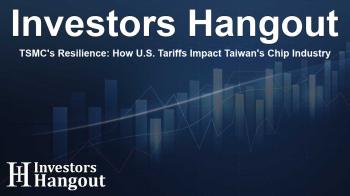TSMC's Resilience: How U.S. Tariffs Impact Taiwan's Chip Industry

Understanding TSMC's Position Amid U.S. Tariffs
Taiwan's economic landscape is significantly shaped by the activities of Taiwan Semiconductor Manufacturing Co. (TSMC), the largest contract chipmaker in the world. Recent discussions surrounding U.S. tariffs on semiconductors have raised questions about the company's vulnerability. Fortunately, Taiwan's top economic planning official has qualified that these tariff threats will have little to no impact on TSMC. Investing heavily in U.S. operations and enjoying tariff exemptions are major factors bolstering the company’s strong position.
Limited Direct Sales to U.S. Market
In a recent statement, Liu Chin-ching, head of Taiwan's National Development Council, explained that TSMC sells just 1% of its semiconductor components directly within the United States. This limited exposure indicates that potential tariffs may not threaten TSMC’s operations as deeply as anticipated.
Key Insights from Liu Chin-ching
Liu emphasized that the broader impact of U.S. tariffs on Taiwan's exports would also be minimal. Approximately 75% of Taiwan's exports will remain unaffected, with much of the remainder already subject to other forms of tariffs, including those on steel and aluminum.
Expanding U.S. Manufacturing Operations
TSMC's operations in the U.S. are notably expanding, featuring plans for a staggering $100 billion investment to establish semiconductor manufacturing facilities. This ambitious campaign aims to strengthen American chip supply chains and reduce dependency on foreign production.
Tax Incentives for Growth
Furthermore, discussions are underway between Taiwanese officials and various U.S. states, particularly Arizona and Texas. These negotiations aim to secure tax incentives that would make it even more attractive for Taiwanese firms to invest in American manufacturing sectors.
Resilient Growth Despite Trade Strains
Even amidst ongoing trade tensions between nations, TSMC has shown remarkable resilience in the semiconductor market. Recent reports indicate that TSMC generated second-quarter revenue of $31.7 billion, reflecting a 38.6% increase year-over-year. This performance exceeds analyst expectations, buoying investor confidence.
Profit Margins and Market Confidence
TSMC's profit margins also illustrated strong results, boasting profits of $13.03 billion, or $2.47 per share. This growth indicates that TSMC effectively navigates market challenges, continuing to thrive even when faced with complexities.
Strategic Partnerships in the AI Sector
The company has cultivated significant partnerships, especially highlighted by recent interactions with Nvidia Corporation (NASDAQ: NVDA). CEO Jensen Huang visited Taiwan to finalize six new product deals, emphasizing the critical role TSMC plays in the artificial intelligence (AI) boom.
Driving Innovation and Market Leadership
With continuous advancements in AI and increasing demand for innovative semiconductor solutions, TSMC is positioned at the forefront of technology. The collaboration with leading firms like Nvidia underscores its commitment to driving technological advancements.
Taiwan's Commitment to Talent and Technological Growth
In addition to its manufacturing strategies, Taiwan is also strengthening its workforce. Liu's insights included plans to allow graduates from 1,500 top universities to work in Taiwan without the necessity of prior overseas experience. This initiative aims to expand opportunities within sectors like AI and advanced semiconductors.
Creating a Supportive Work Environment
With initiatives focusing on improved working conditions and benefits, Taiwanese firms are poised to attract top talent from around the world, enhancing innovation and competitiveness in the global market.
Market Overview and Company Performance
The stock market reflects TSMC's positive outlook, rising 1.35% in a recent trading session and closing at $238.72. Investors are keenly observing TSMC's performance, as indicated by the strong price trend across various investment horizons.
Frequently Asked Questions
What is TSMC's direct exposure to U.S. tariffs?
TSMC sells only 1% of its semiconductor products directly in the U.S., which minimizes the impact of tariffs on its overall business.
How much is TSMC investing in the U.S.?
The company has announced a substantial investment of $100 billion to enhance its manufacturing capabilities in the United States.
What are the expected revenue trends for TSMC?
Recent reports show a significant revenue increase of 38.6% year-over-year, highlighting TSMC's robust growth trajectory.
Which partnerships are critical for TSMC's AI advancements?
Notably, TSMC has partnered with Nvidia, which has solidified its role as a leader in AI chip production and technology.
What initiatives is Taiwan promoting for talent acquisition?
Taiwan is expanding its recruitment initiatives, allowing graduates from top universities to work locally, aiming to boost innovation in technology sectors.
About The Author
Contact Caleb Price privately here. Or send an email with ATTN: Caleb Price as the subject to contact@investorshangout.com.
About Investors Hangout
Investors Hangout is a leading online stock forum for financial discussion and learning, offering a wide range of free tools and resources. It draws in traders of all levels, who exchange market knowledge, investigate trading tactics, and keep an eye on industry developments in real time. Featuring financial articles, stock message boards, quotes, charts, company profiles, and live news updates. Through cooperative learning and a wealth of informational resources, it helps users from novices creating their first portfolios to experts honing their techniques. Join Investors Hangout today: https://investorshangout.com/
The content of this article is based on factual, publicly available information and does not represent legal, financial, or investment advice. Investors Hangout does not offer financial advice, and the author is not a licensed financial advisor. Consult a qualified advisor before making any financial or investment decisions based on this article. This article should not be considered advice to purchase, sell, or hold any securities or other investments. If any of the material provided here is inaccurate, please contact us for corrections.

